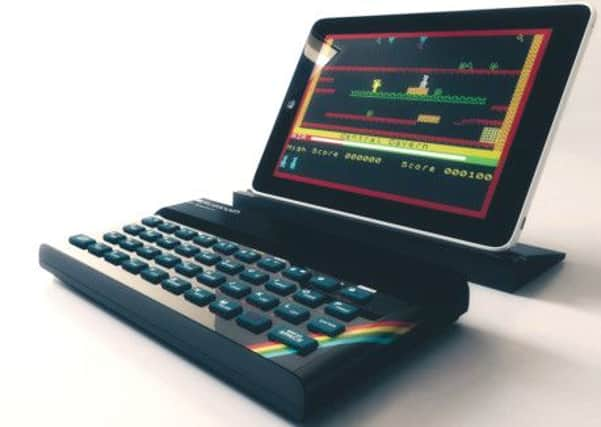Scottish ZX Spectrum set for 21st century revival


Now, nearly three decades after the last units rolled off the production lines of Dundee’s Timex factory, the ZX Spectrum is to be revived for the 21st century.
The computer, hailed as the catalyst for Tayside’s thriving digital economy, will return this year in the form of a wireless keyboard to be used with tablets and smartphones.
Advertisement
Hide AdAdvertisement
Hide AdCombining retro aesthetics with Bluetooth technology, the updated device will also allow the sizeable band of modern Spectrum enthusiasts to play seminal games such as Chuckie Egg and Skool Daze on the likes of iPads and iPhones.


In a nod to its Scottish heritage, the team behind the relaunch, Elite Systems, are even considering producing a limited edition version of the Spectrum emblazoned with the Saltire.
The original 8-bit computer, the brainchild of Sir Clive Sinclair, was engineered by Richard Altwasser and designed by Rick Dickinson. A stalwart of modern British design, it is routinely held up as one of the first computers to appeal to everyday consumers as well as programming hobbyists.
After it went on sale in April 1982, the 3,500 workers at Dundee’s Timex factory struggled to keep up with demand. Soon they were producing more than 70,000 Spectrums a month. Sales passed the one million mark by the end of 1983, and eventually five million units were sold.
Key figures in the Scottish industry believe the close ties between Spectrum and Dundee encouraged many of the city’s budding young coders to view games development as a legitimate career – a legacy that continues to this day, with around 40 games firms active in the area.
Brian Baglow, director of the Scottish Games Network, the industry’s national trade body, said: “There’s no doubt that the Spectrum being manufactured in Dundee was a strong factor in the city’s pioneering position in gaming. It put computers in the hands of many who may not otherwise have had access to them.”
With the programming language, Basic, the ZX Spectrum allowed users to write games as well as play them.
Dave Jones, the founder of DMA Design, creators of Grand Theft Auto and Lemmings, worked as an apprentice engineer at Timex. When he took voluntary redundancy from the factory in 1987, he bought a Commodore Amiga, which helped ignite his coding career.
Advertisement
Hide AdAdvertisement
Hide AdChris van der Kuyl, chair of 4J Studios, the Scots firm behind the multimillion-selling Xbox 360 and PlayStation 3 versions of the hit game Minecraft, owned no fewer than six Spectrums.
“The British computer games development industry’s success is in a large part down to the ZX Spectrum and its dominance of the UK market in the early 1980s,” said Van der Kuyl. “Dundee has a unique place in this story and is the reason why we have such a strong industry today. It was the manufacturing centre, so whilst the machine was £149 in the rest of the UK you could buy one for about £10 and a pack of cigarettes from the right pub in Dundee.”
Mark Ettle, CEO of Dundee-based developers Cobra Mobile, agreed the machine was “the main catalyst for sparking the rolling start of the games industry” in the city.
“Once you got past playing games you started to pick, poke and explore, either directly or with tools like White Lightning, an early complete games-writing system for the Spectrum,” he recalled.
Bitter industrial disputes and Sir Clive’s decision to sell up to Amstrad eventually saw production of the Spectrum switch to Taiwan in 1986.
The resurrected ZX Spectrum is the idea of Elite Systems, a Staffordshire-based firm which started out publishing original Spectrum games, including one of the first titles created by Dave Jones.
Managing director Steve Wilcox said: “The legacy of Scotland’s 30-year connection with the ZX Spectrum endures in the form of a thriving community of commercial game developers and seasoned academics. Similarly, Elite has a multi-decade connection with the device.”
Professor Louis Natanson, who leads the computer games education course at Dundee’s Abertay University, said: “Bringing back the ZX Spectrum will make a lot of gamers and developers very nostalgic, as for many people it was their first taste of affordable gaming.”
Background: Sir Clive Sinclair
Advertisement
Hide AdAdvertisement
Hide AdThe British entrepreneur, now 73, invented the world’s first “slimline” electronic pocket calculator in 1972 and the ZX80, ZX81 and ZX Spectrum computers in the late 1970s and early 1980s.
The ZX80 was the UK’s first mass-market home computer for under £100 and could be bought in kit form or ready-built.
He was knighted in 1983 and in early 1985 launched the Sinclair C5 electric car, which flopped. He sold the Sinclair trademark and computer business to Amstrad for £5m the following year.
Since then the inventor has concentrated on personal transport, including the A-bike, which folds small enough to carry on public transport.
Despite his links with computing, the Mensa member does not use e-mail or the internet because he says technical or mechanical things distract him from the creative process.
Lately, Sinclair has become a keen poker player, appearing in the Late Night Poker TV series and winning the first Celebrity Poker Club spin-off.